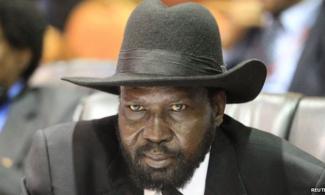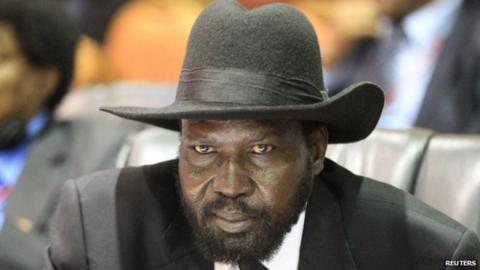
In August 2015, the two opposing leaders signed a peace agreement to end a 20-month civil war that had begun due to a violent rebellion by Mr. Machar.
In the face of a strained relationship between the President of South Sudan, Salva Kiir, and the Vice President and leader of the opposition, Riek Machar, Mr. Kiir has recognized a new Vice President, Taban Deng Gai, the Minister of Mining.
Soon after the world’s youngest country declared its independence from Sudan in 2013, South Sudan experienced a civil war which resulted from the friction between Mr. Kiir and Mr. Machar.
In August 2015, the two opposing leaders signed a peace agreement to end a 20-month civil war that had begun due to a violent rebellion by Mr. Machar. Mr. Deng served as Mr. Machar’s top representative during the negotiations that went into the peace deal which started in 2014 in Addis Ababa, Ethiopia’s capital.
Mr. Machar returned to Juba, South Sudan’s capital, to serve as Vice President next to Mr. Kiir, but clashes between the two sides broke out again on July 7, the eve of the fifth anniversary of South Sudan's independence. The clash led to the death of hundreds and displaced thousands of people.
Mr. Machar’s party itself appears to have its internal divisions, as the party has nominated Mr. Deng, and he accepted the nomination as Vice President on Sunday.
He has been hiding in the capital since the violence erupted earlier in July, saying that he feared for his life. He said he would only return after more international troops are deployed to act as a buffer between the factions. The African Union and the United States already have 12,000 peacekeeping troops situated in the area.
Mr. Deng has indicated that he would “gladly step aside if that can bring peace in South Sudan,” but he is not in support of the deployment of international troops and neither is Mr. Kiir.
Mr. Machar’s supporters have expressed their discontent with the appointment of Mr. Deng, while Mr. Deng insists that he has the opposition’s full support because “Mr. Machar was temporarily unable to serve as vice president,” according to The New York Times.
He was quoted as saying, “I’m just only filling a vacuum.”
Ahead of Mr. Kiir’s recognition of Mr. Deng as vice president, spokesmen for the Machar camp stated that the government was trying to install Mr. Deng as the new vice president. They said that those who supported Mr. Machar were “facing threats and intimidation.”
The secretary general for the Machar faction, Mr. Dhieu Mathok stated that he was assaulted in a hotel on July 14.
At Mr. Deng’s nomination ceremony on Sunday, Mr. Matok dismissed suggestions that he had been coerced into supporting the nomination, saying, “Somebody will say, ‘It’s because he was tortured that he changed his mind.'
“That’s not true. I’m not afraid of anybody.”
Mr. Machar’s spokesman, Mr. Nyarji Roman, who is also in hiding, was quoted as saying that government forces are “trying to kill us in the bush.”
“When parties sign a peace agreement, the main point is to silence the guns,” Mr. Tabang said. “But Taban Deng has no support on the ground, and the commanders on the ground are not loyal to him. So you are putting more oil on the fire.”
The spokesman insisted that Mr. Deng’s appointment would worsen tensions in South Sudan.
